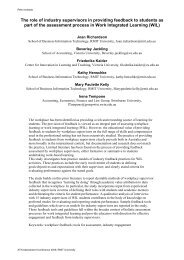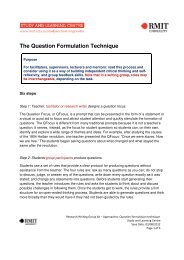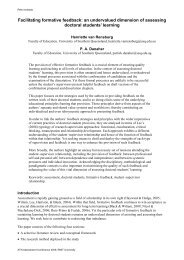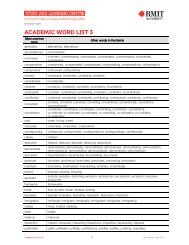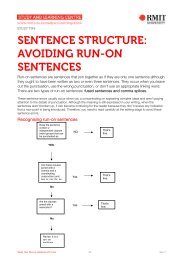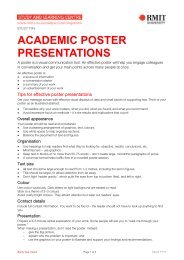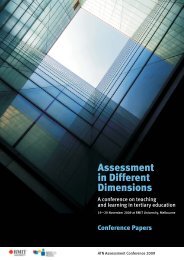student feedback and leadership - Office for Learning and Teaching
student feedback and leadership - Office for Learning and Teaching
student feedback and leadership - Office for Learning and Teaching
Create successful ePaper yourself
Turn your PDF publications into a flip-book with our unique Google optimized e-Paper software.
Part A: Developing a Distributed Leadership Model - Secton 3: Building Leadership Capacity<br />
3.2.3 Act<br />
This cycle saw an increase in the level of activity by all parties involved<br />
in the project.<br />
ART Leaders took on a more proactive role in identifying issues outside<br />
the control <strong>and</strong> responsibility of individual teachers <strong>and</strong> discussing these<br />
in Project Team meetings.<br />
ARTs were assisted by external Facilitators with expertise in pedagogy.<br />
The <strong>leadership</strong> contribution made by Facilitators varied depending on<br />
the ART. One of the Facilitators provided external examples of successful<br />
<strong>student</strong> support, another provided knowledge of issues of pedagogy that<br />
complemented the discipline-based expertise, <strong>and</strong> the third assisted with the<br />
development of an ethics application that would help ART members engage<br />
in scholarship into their teaching practice. An Appreciative Inquiry approach<br />
to identification of issues was adopted by one ART.<br />
ART Facilitators met regularly to share experiences from the different<br />
disciplinary perspectives. Given the value of these meetings as <strong>for</strong>ums <strong>for</strong><br />
linking action being taken by ART members to reflection upon <strong>leadership</strong><br />
issues, it was decided that ART Leaders would be invited to attend the<br />
Facilitator meetings. While this placed further time constraints on ART<br />
Leaders, it did serve to assist to develop their underst<strong>and</strong>ing of the dual<br />
role of academics in improving <strong>student</strong> learning: as teachers designing<br />
<strong>and</strong> delivering the learning experience <strong>for</strong> <strong>student</strong>s <strong>and</strong> as leaders<br />
of teaching practice in positively responding to <strong>student</strong> <strong>feedback</strong><br />
<strong>and</strong> making improvements.<br />
With the addition of leaders from the systems <strong>and</strong> infrastucture providers,<br />
the Project Team exp<strong>and</strong>ed its focus to explore the <strong>leadership</strong> contribution<br />
of Service providers in the improvement of the <strong>student</strong> learning experience.<br />
Discussion in the Project Team concerning issues raised by the ARTs <strong>and</strong><br />
timely action taken by representatives of these service providers to the<br />
issues identified by the ARTs, led to the Project Team adopting a more<br />
central role in this project.<br />
The second Plenary was held on August 7th. The main focus of the plenary<br />
was to facilitate the broader sharing of ART progress <strong>and</strong> experience to date<br />
<strong>and</strong> to provide the opportunity <strong>for</strong> ART members to reflect upon the<br />
of question of <strong>leadership</strong> capacity building that was occurring.<br />
Presentations identified the ongoing focus of each of the ARTs on the analysis<br />
of <strong>student</strong> <strong>feedback</strong> data. This confirmed the importance of the need <strong>for</strong><br />
a more multi-functional <strong>leadership</strong> approach to <strong>student</strong> <strong>feedback</strong>.<br />
The School of Mathematical <strong>and</strong> Geospatial Science ART analysis of CES<br />
<strong>feedback</strong> had revealed issues of learning environment (room allocation,<br />
noise level, computer availability) as a problem.<br />
ART members had begun to share learning <strong>and</strong> teaching techniques <strong>and</strong><br />
this had led to positive teaching strategies that had encouraged staff to trial<br />
changes in their own classes. For example the ART Leader reported an across<br />
Page 45



